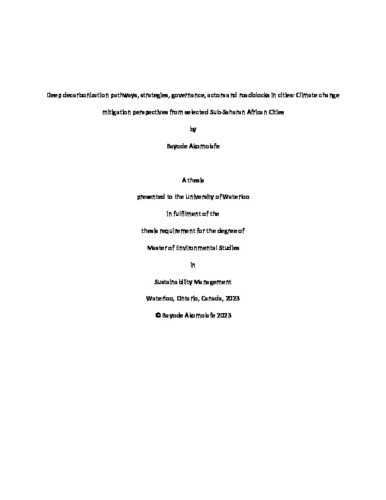| dc.contributor.author | Akomolafe, Bayode | |
| dc.date.accessioned | 2023-03-30 12:52:48 (GMT) | |
| dc.date.available | 2023-03-30 12:52:48 (GMT) | |
| dc.date.issued | 2023-03-30 | |
| dc.date.submitted | 2023-03-25 | |
| dc.identifier.uri | http://hdl.handle.net/10012/19238 | |
| dc.description.abstract | The complex and multidimensional effect of climate change, coupled with low socioeconomic development in sub-Saharan Africa, makes the region vulnerable to changing climate and threatens its inhabitants' survival, livelihood and health. Subnational actions have been widely acclaimed as an effective way to combat climate change due to their nearness to the epicenter of global warming – urban centers. This is because over 70% of global GHG emissions occur in urban areas. To reduce GHG emissions, local governments in sub-Saharan Africa have been developing and implementing climate action plans.
This research aims to extend the understanding of global decarbonization dynamics by studying four major African megacities' climate plans and actions. This research compares the strategies and governance structures recommended for local climate mitigation action in academic and grey literature to those described in the deep decarbonization plans of leading local governments to identify innovative implementation strategies and governance approaches for urban deep decarbonization in developing nations. This presents a new perspective in the quest for decarbonization to reduce anthropogenic global warming through the exploration of the concepts and visions of deep decarbonization pathways and examining the strategies toward reducing GHG emission in “uncharted territories” - selected African cities.
The research is based on the case study of pathways, strategies, governance mechanisms, and actors for deep decarbonization in four leading cities in sub-Sahara Africa using the qualitative research method. The four case cities are Accra (Ghana), Addis Ababa (Ethiopia), Lagos (Nigeria) and Nairobi (Kenya). The study’s methods included exploring the climate action plans of the case cities and reviewing data in the Climate Disclosure Protocol (CDP) and other city-specific deep decarbonization documents. Interviews were also conducted with the city officials involved in sustainability and climate change activities within the case cities. This was done mainly to get answers to gaps in document analysis and triangulate some of the empirical findings. The study also compared the emerged patterns from the case cities to typical cities in the global north to gain practical intricacies into the difference in climate change mitigation practices, governance and management across the divide.
The contributions of this study to the body of literature on decarbonization frameworks are in seven major areas through the extension of literature to include the innovative approaches being deployed by cities in sub-Saharan Africa to mitigate Climate change. This study contributes new insight into the following areas: decarbonization of energy and waste management, increasing local carbon sinks, climate action coordination structure, vertical integration approaches, self-regulating governance mode, the role of traditional institutions and major barriers to decarbonization efforts at the city level.
Given that it identifies emerging best practices, the study's findings can be helpful to practitioners pursuing local deep decarbonization and international organization working on deep decarbonization at the city level. | en |
| dc.language.iso | en | en |
| dc.publisher | University of Waterloo | en |
| dc.subject | Africa | en |
| dc.subject | Cities | en |
| dc.subject | Urban development | en |
| dc.subject | Local government | en |
| dc.subject | Climate | en |
| dc.subject | Climate change | en |
| dc.subject | Climate governance | en |
| dc.subject | Strategy | en |
| dc.subject | Pathways | en |
| dc.subject | Kenya | en |
| dc.subject | Deep decarbonization | en |
| dc.subject | Decarbonization | en |
| dc.subject | Sub-Saharan Africa | en |
| dc.subject | Sustainable development | en |
| dc.subject | Lagos | en |
| dc.subject | Nigeria | en |
| dc.subject | Ghana | en |
| dc.subject | Accra | en |
| dc.subject | Ethiopia | en |
| dc.subject | Addis Ababa | en |
| dc.title | Deep decarbonization pathways, strategies, governance, actors and roadblocks in cities: Climate change mitigation perspectives from selected Sub-Saharan African Cities | en |
| dc.type | Master Thesis | en |
| dc.pending | false | |
| uws-etd.degree.department | School of Environment, Enterprise and Development | en |
| uws-etd.degree.discipline | Sustainability Management | en |
| uws-etd.degree.grantor | University of Waterloo | en |
| uws-etd.degree | Master of Environmental Studies | en |
| uws-etd.embargo.terms | 0 | en |
| uws.contributor.advisor | Clarke, Amelia | |
| uws.contributor.affiliation1 | Faculty of Environment | en |
| uws.published.city | Waterloo | en |
| uws.published.country | Canada | en |
| uws.published.province | Ontario | en |
| uws.typeOfResource | Text | en |
| uws.peerReviewStatus | Unreviewed | en |
| uws.scholarLevel | Graduate | en |

